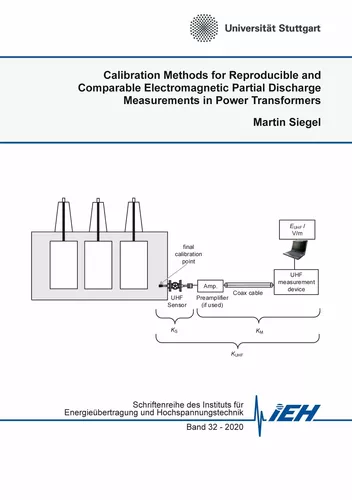The reliability of electrical energy networks depends on the quality and availability of their electrical equipment, e.g., power transformers. Local failures inside their insulation can lead to breakdowns resulting in high outage and penalty costs. To prevent these destructive events, power transformers are tested for partial discharge (PD) activity in a routine test before shipment. Furthermore, PD activity can be evaluated as a diagnostic measurement on-site (on-line or off-line) or be constantly monitored during service using the ultra-high frequency (UHF) method.
In this thesis, a calibration procedure is proposed for the UHF method used in power transformers, which is lacking so far. The calibration process is required to ensure both reproducibility and comparability of UHF measurements. Only a calibrated UHF measurement procedure can be deemed reliable and eventually be introduced to supplement in (site-)acceptance tests of power transformers. The proposed calibration method considers two factors: The influence of the UHF sensors' sensitivity and that of the UHF instrument characteristics, including accessories like cables, pre-amplifier, etc. The UHF instruments' influence is corrected by using a defined and invariable test signal as a reference for all recording devices comparable to the calibration method used in IEC 60270 for electrical PD measurement.
The sensitivity of the UHF sensor is addressed by a characterization of UHF sensors using the antenna factor (AF) measured in a special reproducible setup, i.e., a GTEM cell. In this thesis, a self-built GTEM cell is presented, which is oil-filled to address the environmental conditions inside a transformer where the sensor will be used. With such a cell, influences on the AF of UHF sensors are investigated, and it is shown that sensor sensitivities measured in an air-filled cell can be corrected to the oil environment.
A practical evaluation of the proposed calibration procedure is performed in a laboratory setup on a distribution transformer with different UHF instruments and sensors using artificial PD signals and real high voltage driven PD sources.
Finally, this thesis identifies future research topics, which may be needed to improve the proposed UHF calibration procedure for power transformers and the UHF method in general.
Eigene Bewertung schreiben





Es sind momentan noch keine Pressestimmen vorhanden.